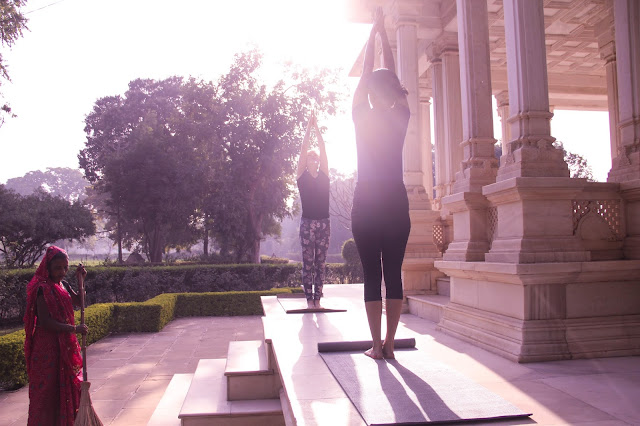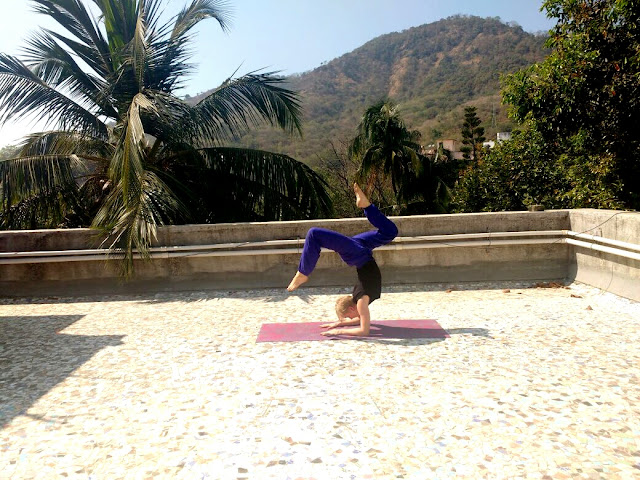Yamas - the five "DON'T"s in Yoga
The
Yamas are life skills practiced by a true Yogi in every action, thought and
word. With discipline and without exceptions. Everyone can practice them. Even
a business man or someone who has never tried (physical) Yoga (=Asanas) before.
You need a lot of
self control to practice these principles, but your surroundings
are like a mirror. When you truly succeed in following those Yamas, only
good will happen to you and it will transform your life!
Try it, it may sound unbelievable, but it really does work. The better you get in these practices,
the easier your life becomes. I know it from my own experience! The
5 Yamas are1.
Ahimsa2.
Satya3.
Asteya4.
Brahmacharya5.
Aparigraha The
names are in Sanskrit, a very meaningful language of the ancient scriptures
about Yoga philosophy.
Sanskrit words always have several deeper meanings which we can nowadays, with modern languages, hardly describe in words. I will try to explain it as far as I can and as easy as possible.
AHIMSA
Ahimsa is the first principle and it can be translated as non-violence against your self and others.It means you should not do anything that might hurt someone. Not even yourself. For your Yoga Asana practice it means to do the postures only with the right intensity. Practice a pose until you feel a stretch or a contraction in your muscles, but don't overdo it.This is the physical part. Now to the mental part. Don't think painful thoughts such as "I am not good enough, she is doing better than me". Having grown up in competitive societies we tend to be super strict with ourselves and with others. Work on that. Be compassionate and loving. Try not to hurt anyone physically or verbally with aggressive words or even mentally. Don't even think a violent thought. If you manage to develop such a positive friendly way of thinking and acting, nobody will hurt you in return. Not even a wild animal would attack you. Your aura changes into friendliness, peacefulness and goodwill which attracts the same in others. Practice it constantly towards everyone. Even the people you think you "hate" are included. As soon as you recognize that you were just thinking negatively or aggressively, try to find a positive thought to replace the negative. Develop a way of thinking that doesn't involve any violence against anyone. Cultivate goodwill, compassion and positive thinking. If everyone would follow this simple principle, the world would be a different place.
SATYA
Satya is the second Yama and it means truthfulness. It tells us to always be honest. Don't say anything which is not true unless it is really, really necessary to avoid someone else's or your own pain. Say the truth to others and also to yourself. Don't lie. It will only make your life complicated.I know, it takes a lot of courage sometimes to tell the truth, but just do it. Lying is for weak people. Be courageous and strong and stand behind the truth. Therefore you have to first become more aware of what you say to yourself and to others and question it. Is it really true? Do I really need this piece of chocolate now because I feel so stressed? Do I really want to come to her place tonight? If not, don't say it. Just keep quiet or tell the truth. Try to walk on the path of sincerity. Find humble words and explain yourself instead of telling lies. Find out what is really true and then express it in an understandable way so that it doesn't hurt anyone. You will be surprised how well people can deal with your true you. All consisting lies may appear easier at first, but in the end they only create wrong expectations, misunderstandings, illusions and problems which finally create pain and hurt you and others. The longer you lie, the worse. Lies don't help anyone. The truth is anyways the truth, so why not admit it?
ASTEYA
Now we come to Asteya, which is non-stealing. Everyone knows what non-stealing means. Don't take something as your own which is not yours. But, like all Yamas, it has to be practiced not only physically. Not to take or use anything which is not yours means also not to present other people's ideas or words as your own. When you make use of the idea of someone else, just be honest enough to mention that you got it from someone else. It will keep your ego low. When you think about the meaning of Satya (sincerity) and Ahimsa (not hurting) in this context, you will see how all those principles are connected. When you want to follow one of the Yamas with 100%, 24/7, you automatically practice all of them and you practice YOGA. You will become more calm, mindful, aware and peaceful. Just choose one and try it.
BRAHMACHARYA
The next Yama is Brahmacharya. Originally it was translated as abstinence, but if you don't want to become a monk, it is not necessary to abstain your sexual pleasures completely. In fact, from a biological point of view that would be unhealthy and the end of humanity. That's not what Yoga wants.For us "normal" people, living a "normal" life in the modern society, Brahmacharya is simply mindfulness, moderation and discipline in all pleasures. Instead of going to a night club and having one night stands, a Yoga practitioner choses a healthier and a more meaningful way to spend his energy. Brahmacherya therefore means control of desires and moderation. Be more mindful what you really need in every situation, instead of blindly running after sensual pleasures. We often confuse pleasurable things with things that are good for us. We lie to ourselves that we "need" it. Another example is food. Nowadays living in abundance constantly creates desires in us which we have to control. We don't really need all that but when we see it, we have the feeling that we need it right now and that we need more than we were planning to buy or eat. You see somebody eating icecream and you suddenly think that this is what you need. After a look at the menu you think you need four scoops of icecream with a topping. If you practice Brahmacharya you enjoy only one scoop every now and then but you eat it as slowly as an average person eats a whole bowl of icecream. Trust me, one scoop of icecream eaten with full awareness and focus will be tastier than a whole icecream bowl with distracted thoughts. Enjoy what you want, but in moderation.Brahmacharya is also connected to Ahimsa and Satya. You know (Satya) what too much icecream does to your body (Ahimsa), so be honest to your self and eat one scoop instead of four scoops. Take it as a challenge. Set your goals and do it. It requires will power and a strong mind to master Brahmacherya. This strong mind and discipline will help you in all aspects of life.
APARIGRAHAH
Aparigrahah is non-possessiveness. Don't hord things which you don't need. Like Brahmacherya it requires reflection and discipline. Fulfill your basic needs and don't be greedy for more. We tend to buy more and more material things just because we see them in the shops or in an advertisement. We want to earn more and more money and then we lose it somehow. We get attached to people and think we can not live without them anymore. All offers and possibilities create desires in us. We believe we need all the things and collect unnecessary, additional stuff. But do we really need it? Most of the time we are so busy running after new desires that we forget what we already have. We constantly want more. Our closets overflow and we only use a tiny amount of the things we own.An untidy, jammed home is a sign for a cluttered mind. In a yogic lifestyle you keep both clean and tidy, your home and your mind. The more space and cleanliness you create in your home, the more clear becomes your mind. So just start on the outside and the inner change will come. The things you have not used for one year you will most probably never use again. Sort them out and donate them if you don't want to throw them away. And then start a new chapter of your life. A Yogic chapter. Question what you really need and implement Aparigraha in your life. If you successfully control your desires and manage to possess only as much as you need, you will save a lot of money and energy and feel lighter and more satisfied than you have ever felt before. So let me summarize the Yamas very briefly.
Ahimsa - Don't hurt anyone or cause pain verbally, physically and in your thoughts. Then everyone will be peaceful and friendly to you in return. Even strangers.
Satya - Don't say anything which is not true. Then all you say and believe will come true.
Asteya - Don't take or use anything which is not yours. Then nobody will steal anything from you.
Brahmacharya - Don't consume or enjoy pleasures in excess. You will find greater satisfaction, feel healthier and stronger.
Aparigraha - Don't horde and crave for more, but appreciate what you already have. The universe will make sure to provide you with everything you need.Day one or one day. The choice is yours.




Comments
Post a Comment